Words of Wisdom - Shastra
& Shastrakaras speak
For Books and shastra downloads see Main Index, under
Books:
Om Namo Bhagavate Vasudevaya
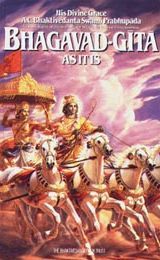

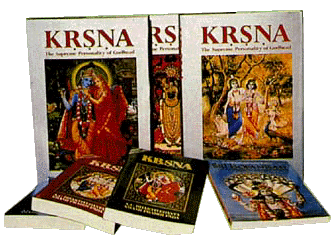
The Complete Works of Srila Prabhupada
All the books, the letters and conversations at your
fingertips


All Srila Prabhupada's books and more on one disk
http://www.vedabase.com





Srila Prabhupada's Audio lectures to listen to on-line:
http://www.hare-krishna.org/srila-prabhupada-lectures.htm
Listen to Srila A.C. Bhaktivedanta Swami Prabhupada on-line
- all 900 of his lectures are available HERE:
http://www.prabhupadavani.org/
Srimad Bhagavatam - the entire lecture series listen and
read along on-line - Narrated by Amala Bhakta dasa:
http://www.prabhupadavani.org/SB_index.html
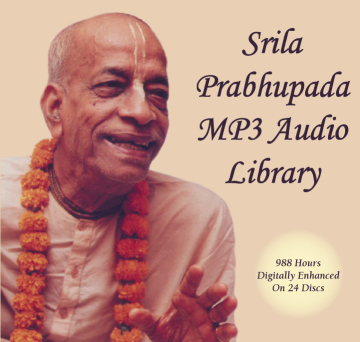
The new enhanced Prabhupada MP3 series
http://www.prabhupada.com/store/store.php?page=product.php&id=MP3AUDIOLIB

Srila Prabhupada Vyasa-puja book 2007
http://www.krishna.com/node/1048
Vyasa-puja is an annual celebration by the devotees of Lord Krishna
to offer homage to their guru, or spiritual teacher.
There are two versions of the Vyasa Puja Book based on the speed of
your internet connection.
If you are unable to open the file, download Acrobat Reader.
High speed connections, with pictures.
Vyasa-puja
Book 2007 [PDF/ZIP, 2.11MB]
Low speed connections, no pictures.
Vyasa-puja
Book 2007 (no pictures) [PDF/ZIP, 2.11MB]








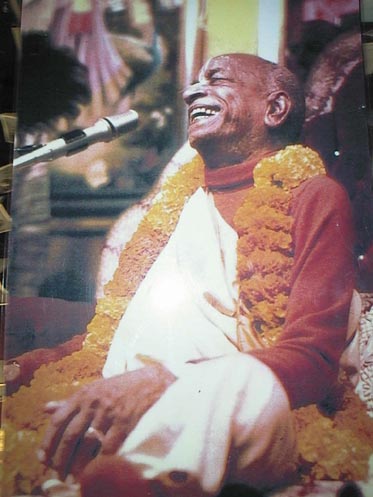
Visit "Prabhupada Connect" for all manner of Prabhupad
Nectar:
http://www.prabhupadaconnect.com/Index.html
Srila Prabhupada's Final Lesson Video - Downloadable and
viewing on-line
http://users.iskconludhiana.com/images/thumbnails.php?album=21


All Srila Prabhupada's original books
available for sale here.

Download all the Hare Krsna teachings which includes
all Vaisnava and
Vedic concepts by visiting one of the sites listed at
the following address.
http://www.geocities.com/suci123/bookdownloadsites1.html
The Bhaktivedanta Book Trust
Srila Prabhupad Memorial Library
http://www.krishna.com/main.php?id=33


33 Books Online Including Srimad Bhagavatam!
http://www.geocities.com/freeprabhupadabooks
The compressed "self extracting" file mentioned is now currently
available for download
http://www.krsnaconsciousness.org/Gauranga/Folio/BhaktivedantaVedabase_DOS.exe

Download or Listen to Prabhupad Bhajans HERE:
http://www.prabhupadavani.org/web/text/Bhajans.html


On-line 1972 McMillan edition - Bhagavad Gita As It Is:
http://www.asitis.com/

Bhagavad Gita AS IT IS on-line through the Tirupathi
Balaji site:
http://www.bhagavad-gita.us/

Bhagavad Gita Study guide on-line book:
http://chantandbehappy.com/gita/studyguide/StudyGuide-main.htm
Bhagavad Gita Study guides by numerous Iskcon devotees
- FREE downloads:
http://www.veda.harekrsna.cz/library/#3

All the Scriptures you'd ever need 4 FREE
http://www.hknet.org.nz/index-books.htm
http://www.hknet.org.nz/DDB.htm
http://www.hknet.org.nz/DDB2.html
last updated 4th August 2003


Srimad Bhagavad Gita AS
IT IS
Bhagavad Gita: Chapter
6 - Dhyana-yoga
TEXT 43
tatra tam buddhi-samyogam
labhate paurva-dehikam
yatate ca tato bhuyah
samsiddhau kuru-nandana
WORD FOR WORD
tatra--thereupon; tam--that; buddhi-samyogam--revival of consciousness;
labhate--gains; paurva-dehikam--from the previous body; yatate--he endeavors;
ca--also; tatah--thereafter; bhuyah--again; samsiddhau--for perfection;
kuru-nandana--O son of Kuru.
TRANSLATION
On taking such a birth, he revives the divine consciousness of his
previous life, and he again tries to make further progress in order to
achieve complete success, O son of Kuru.
PURPORT by HDG Srila A.C. Bhaktivedanta Swami Prabhupada:
King Bharata, who took his third birth in the family of
a good brahmana, is an example of good birth for the revival of previous
transcendental consciousness. King Bharata was the emperor of the world,
and since his time this planet has been known among the demigods as Bharata-varsa.
Formerly it was known as Ilavrta-varsa. The emperor, at an early age, retired
for spiritual perfection but failed to achieve success. In his next life
he took birth in the family of a good brahmana and was known as Jada Bharata
because he always remained secluded and did not talk to anyone. And later
on he was discovered as the greatest transcendentalist by King Rahugana.
From his life it is understood that transcendental endeavors, or the practice
of yoga, never go in vain. By the grace of the Lord the transcendentalist
gets repeated opportunities for complete perfection in Krsna consciousness.
His Divine Grace A.C. Bhaktivedanta Swami Prabhupada
Copyright 1983 The Bhaktivedanta Book Trust International. Used with
permission.

Bhagavad Gita As It Is - http://www.asitis.com/
Bhaktivedanta Vedabase - Bhagavad Gita on-line http://bhagavadgitaasitis.com/
Bhaktivedanta VedaBase: Bhagavad-gita As It Is http://vedabase.net/bg/en
Bhagavad Gita Multi Media Web-version http://chantandbehappy.com/gita/
Listen to Bhagavad Gita on line - http://www.Gitamrta.org
View our Bhagavad Gita Overview:
http://www.hknet.org.nz/BG.html
Archive: http://www.cs.rice.edu/~vivek/btg/archive/
Home Page: http://www.cs.rice.edu/~vivek/btg/
Join Bhagavad Gita eGroups HERE
mailto:bhagavad_gita-owner@egroups.com


Prabhupada Uvacha:
(here's some nectar, sometimes it comes in the form of Srutakirti prabhu's
diary, other times from Govinda dasi's diary, Hari Sauri prabhu's Transcendental
Diary, Bhurijan prabhu's book, or sometimes from a letter, or other related
source, but still nectar...)
Life's goal
In November 1935, Abhay goes to Radha Kunda to
see his spiritual master again. Srila Bhaktisiddhanta takes this opportunity
to speak in confidence to his grhastha disciple, who is aloof from the
Gaudiya Math's internal politics. "It would be better to take the marble
from the floor and secure money," he confides. "If I could do this and
print books, that would be better. Since this temple has been given by
Mr. Dutta our men are fighting, 'Which room I shall occupy?' So I know
there will be blazing fire here. I had a desire to print some books. If
ever you get money, print books." The message goes deep into Abhay's heart.
A year later, Abhay writes to Srila Bhaktisiddhanta
in Puri asking if there is some special service he can do for him. Within
two weeks he receives a letter, dated December 13, 1936:
I am fully confident that you can explain in English
our thoughts and arguments to the people who are not conversant with the
languages of the other members. This will do much good to yourself as well
as your audience. I have every hope that you can turn yourself into a very
good English preacher if you serve the mission to inculcate the novel impression
of Lord Caitanya's teachings to the people in general as well as philosophers
and religionists.
Abhay realizes that this is the same message he
received at their first meeting in 1922. A fortnight later on New Year's
Day, 1937, he receives the news of his spiritual master's passing away.
Feeling empty and helpless, he finds solace in that last letter in which
he was given his life's work. That final instruction now becomes a mandate
that enters deep into his soul. But being a householder, he is not sure
how he will be able to fulfill this daunting task.
When one strictly tries to serve one's spiritual
master, everything unfolds by the arrangement of Krsna. Taking up the serious
study of Bhagavad-gita, Abhay is particularly impressed with the commentary
by Visvanatha Cakravarti Thakur. In connection with the verse vyavasayatmika
buddhir ekeha kuru-nandana, Visvanatha Cakravarti explains that one should
embrace the words of the spiritual master as his life and soul, rigidly
carrying out the specific instructions without caring for personal loss
or gain.
The best kind of intelligence I can have is intelligence
used in the service of Krsna. Intelligence is defined as "fixed" when it
is intent upon my spiritual master's instructions, such as chanting the
name of Krsna, remembering His activities, and performing service to His
lotus feet. My spiritual master's instructions are my sadhana and my life,
both in the beginning stages of bhakti as well in bhakti's perfectional
stage. I desire only to follow his instructions, and I accept nothing else
as my life's work, even in dreams. Whether I am happy or distressed, whether
the material world remains or is destroyed, I don't care. There is no loss
for me. I simply must carry out the orders of my spiritual master. Steadfast
upon his orders is determined intelligence in devotional service, and only
by being fixed on his orders can such determined intelligence prosper.
Purport to Bhagavad-gita 2.41 by Visvanatha Cakravarti Thakur
Abhay is so inspired by this insight that he makes
it the main tenet of his life -- it becomes his raison d'etre.
In 1939, Abhay relocates back to Calcutta. Seeing
his determination and worthy Vaisnava qualities, his sannyasi godbrothers
confer upon him the title "Bhaktivedanta," which indicates both devotion
and the ultimate attainment of knowledge. In his usual humble manner, Abhay
accepts the honor in a mood of responsibility, determined to live up to
the purport of the name.
- From the "Radha-Damodara Vilasa" by HG Vaiyasaki
dasa
To receive little snippets of nectar like this on a daily basis subscribe
HERE: or If you want to introduce anyone else in reading Srila Prabhupada
Nectars, please send their eMail addresses to mailto:krpamaya_gauranga@hotmail.com
Please Chant:
 Hare
Krishna Hare Krishna Krishna Krishna Hare Hare
Hare
Krishna Hare Krishna Krishna Krishna Hare Hare
 Hare
Rama Hare Rama Rama Rama Hare Hare
Hare
Rama Hare Rama Rama Rama Hare Hare
...................and be Happy

Listen to Srila Prabhupad on-line
....a different lecture, morning walk, conversation or
class daily.
"Everyone Is Spirit-Servant"
Srimad-Bhagavatam 1.16.19
Los Angeles, July 9, 1974
Listen to the entire lecture on-line:
http://prabhupadaradio.com/M3U/Bhagavatam/m3u_II/SB274.m3u
Prabhupada:
dharma uvaca
kaccid bhadre 'namayam atmanas te
vicchayasi mlayatesan mukhena
alaksaye bhavatim antaradhim
dure bandhum socasi kancanamba
"Dharma [in the form of bull] asked: Madam, are you not hail and hearty?
Why are you covered with the shadow of grief? It appears by your face that
you have become black. Are you suffering from some internal disease, or
are you thinking of some relative who is away in a distant place?"
Actually the cows... When I was in New Vrindaban, our Kirtanananda Maharaja
purchased one cow without calf. (someone says, "Children have to go out")
Yes. So that cow was actually crying because the calf was taken away for
slaughtering. It is not that they have no soul, they cannot understand,
they have no feeling. But they are helpless. Everything is there. The butchers,
the cow slaughterers, or their supporters, they say wrongly that the animal
has no soul. This is a rascal philosophy. Why animal has no soul? The question
should be...
Here Yamaraja is addressing the cow as amba, mother. "Why you are so
unhappy? From your face it appears." So Yamaraja was foolish man, that
he is addressing a cow as mother? This is civilization. It doesn't matter
one is appearing as a cow or a man or a dog or a demigod or a civilized
man, uncivilized man. One who knows that the soul is there... Unless there
is soul, how Yamaraja is asking the cow, "It appears that you are very
much bereaved, so what is the cause, mother, of your bereavement?"
So this culture, that Yamaraja, is asking an animal, mother... Without
any soul? No. Everyone has soul. The rascals, they do not know it. One
has to become pandita. Panditah sama-darsinah [Bg. 5.18], in the Bhagavad-gita
it is said. So those who are actually learned, they know. They know that
one may be a living entity, one may be a tree, one may be an animal, one
may be a cow, one may be an elephant, one may be a learned brahmana scholar,
one may be a candala, untouchable. Everyone is a soul. Panditah sama-darsinah.
vidya-vinaya-sampanne
brahmane gavi hastini
suni caiva sva-pake ca
panditah sama-darsinah
[Bg. 5.18]
Pandita, one who is learned, he knows that all of them, animals, trees,
plants or human being or demigods, everyone is the spirit soul. Now they
are simply encaged in different bodies according to different karma. The
soul, part and parcel of God, wanted to imitate God's supremacy, and they
wanted to enjoy. But in the spiritual world there cannot be second enjoyer.
The only enjoyer is Krsna. Bhoktaram sarva-loka, bhoktaram sarva-yajnanam
sarva-loka... He is the supreme proprietor, supreme being. In the dictionary
you will find, "the supreme being." "Supreme being" means nobody can be
equal to Him, nobody can be greater than Him. That is, means supreme. So
how one can become an imitator of Krsna? That is not possible. That imitation
is possible here in this material world, because they are all rascals.
So one rascal may claim that "I am God," imitation, but as soon as he claims
like that, any intelligent man knows that he is a rascal. That's all. That
very assertion will establish that he is a rascal.
Nobody can be God. God is one. And religion is also one. If God is one,
then how religion can be different? Just like state laws. If the state
is one, the law is also, everyone. Now the ordinary law, just like "Keep
to the right," if somebody says, "No, this is Christian law. Hindu law,
‘Keep to the left,' " will it be accepted? If I say, "I am Hindu, I am
coming from India. My law is ‘Keep to the left.' " In India, the same thing,
"Keep to the left." And many other countries also. So here, because all
these laws are made by rascals, in some country you keep to the left, some
country you keep to the right. And which is correct, that is unknown. That
is unknown. Therefore for the foolish person, "This is Hindu religion,'
" "This is Christian religion," and "This is Muhammadan religion." Religion
is one. How it can be Hindu religion, Christian religion? No. Religion
is one. God is one. Therefore religion is one. Because religion means the
law or the order given by God. That is religion. Simple definition.
Therefore Krsna says, sarva-dharman parityajya mam ekam saranam vraja
[Bg. 18.66]. That mam ekam saranam vraja, "Surrender unto Me," that is
religion. So one has to surrender. Either he is a Hindu or a Christian
or Muhammadan, he has to surrender. That is religion. One cannot say that
because we are professing Christian religion, we haven't got to surrender
to God. Will anybody say? Will any Christian will say like that? Or any
Hindu will say like that? Or any Muhammadan will say like that? No. Everyone
has to surrender to God. That is religion. Therefore in the Bhagavata you
will find the verse: sa vai pumsam paro dharmo yato bhaktir adhoksaje [SB
1.2.6]. That is first-class religion which is teaching the followers to
understand the Supreme.
Now, "Supreme I cannot see." You cannot see. Therefore Supreme's name,
another name is Adhoksaja, "beyond the perception of your experimental
knowledge." That is called adhoksaja. Adhah-krta aksaja jnanam yatra. By
your experimental knowledge you cannot understand. The same thing, that
if you say, "I do not see the President of the United States. Therefore
I do not believe this law, ‘Keep to the left.' " No, no. If you don't believe,
that is your business. But as soon as you violate this law, immediately
you are under prison. You have seen the President or not seen, it doesn't
matter. The law will act. Similarly, you believe in God or do not believe
in God. It doesn't matter. The God's order, the God's law, will work on.
And for this purpose the material energy is there.
So here it is said... Yamaraja is inquiring the cow because she is very
much threatened by the butcher. The butcher was ready to kill, and she
was trembling. So Yamaraja is asking, kaccid bhadre anamayam atmanas te.
Just like we would ask some friend or relative that "I think you are all
right?" The same thing is being inquired. "Why you are appearing so much
bereaved? What is the cause?" Alaksaye. "It appears that you are within
very sorry." Alaksaye bhavatim antaradhim. "Some distress within yourself."
Dure bandhum socasi. Because in this material world we are always distressed.
It is not that we are happy. That is an illusion. That is not fact. We
are always distressed. So there are three kinds of distresses: Adhyatmika,
adhibhautika, and adhidaivika. Here it is inquired that bhavatim antaradhim.
Adhi. And antara means within the body or within the mind.
So, "Are you suffering some pains on account of your body or mind?"
This is called adhyatmika. Adhyatmika means the body. The body and the
mind. That's called adhyatmika. Adhibhautika, sufferings offered by other
living entities. And adhidaivika. Adhidaivika means sufferings offered
by the demigods. Just like famine, pestilence, earthquake. You have no
hand. You may be a very big, big scientist, but when this trembling of
the earth, "Oh, God save us, God save us, God save us." (laughter) Yes.
Even that sputnik... Our scientist... Where is scientist? What is that,
sputnik? They were asking, "God shall...?"
Svarupa Damodara: Just as they were trying to go to the moon.
Prabhupada: What is the story? You can little explain.
Svarupa Damodara: That there was an explosion in the (indistinct), and
they could not go to the moon. So they were in danger in outer space. So
they were requesting all the people so to "Pray to God so that I can come
back safe and sound to this planet." (laughter)
Prabhupada: When they are in danger they pray to God for safe and sound,
but when they go to the moon planet: "We are scientist." (laughter) Just
see how much foolish they are! When they go to the moon planet, at that
time, "God give us permission, we may go"? No. "We are scientists. (laughter)
We don't care for God." But when they are in danger, "God save us." (laughter)
Just see what kind of scientists they are. This is practical. I am very
glad that our Doctor Svarupa Damodara has mentioned this in his book, Scientific
Basis of Krsna Consciousness.
So that is the fact. And there is a version of Tulasi Dasa in Hindi.
It is said sukse sabe hari bhaje, duhkhse saha hari bhaje, sukse bhaje
khoya.(?) Or sukhase ara hari bhaje, tu duhkha hase hoya(?). It is very
nice instruction. The instruction is that when one is distressed, everyone
remembers God. Yes. Duhkhse saba hari bhaje. Saba means "all." At that
time... Just like in the last war, Second..., last war, when everything
was in danger, Mr. Churchill started this movement B(?), and they were
all going to churches -- when the situation was very grave. And in Germany
especially, because war was very, going on very seriously, so there was
no men, so all the women, they went to the church and pray God, somebody...
Woman means husband, son or father... Prayed, "Let my father come back"
or "Let my husband come back" or "my son." But nobody came back. So they
became atheist. This is the version of my one German Godbrother friend.
So he said that all of them became atheists. Why? They prayed so much to
get back their husband or son or father: nobody came back. "Then there
is no God." This is their conclusion. That means, "God is our order supplier.
God is our servant." Just like I ask my servant or my disciple, "You do
this," and he must do it. We cannot accept God like that. God is neither
going to be your servant.
So those who are going to religious life, making God as their servant,
they will be failure. You must approach God as master. You should become
servant. The so-called religionist, they accept God as their order-supplier
servant: "I must pray to God." Whenever there is some inconvenience, "I
must pray," or "I must... " Not "must." "At that time I shall pray, and
then I shall finish that prayer, and God must supply. If God does not supply,
then there is no God." This is the general attitude. But that should not
be done. The real religion is, as Krsna says in the Bhagavad-gita, is sarva-dharman
parityajya mam ekam [Bg. 18.66]. First of all surrender. Then talk of mercy
and this or that. Also, although God is very merciful, even those who are
simply asking from God, not prepared to give anything, God is merciful,
even though he...
Therefore He has given this field. "All right, you want to become another
God or competitor of Me? You live in this material world and begin your
life as Brahma. I give you first-class chance. And then gradually, you
become the worm of the stool." (laughter) This is called karma-kandiya-vicara.
First of all we get our very opportunity. Just like you Americans, you
have got good opportunity. I have several time mentioned that you have
wealth, you have got education, you have got beauty, janmaisvarya, and
heritage also. People outside your country, they know, "Oh, he is American.
He is very advanced." You have got respect. So this is, this is due to
pious life. If one is pious, he gets all those opportunities. Janmaisvarya-sruta-sri.
This is... Janma means to get birth in high family, aristocratic family,
or to become the members of a big nation. This is called janma. Janma means
birth. And aisvarya, opulence, money. Janma aisvarya sruta, aisvarya, and
sruta. Sruta means education. And sri means beauty. These four things are
outcome of previous pious life. So you have got this opportunity. You have
got. Now you utilize these assets of life -- nice birth, opulence, beauty,
education -- for Krsna consciousness. Otherwise, you take the chance of
Brahma, and then go to become the worm of the stool. The law of karma is
like that.
So one who is opulent in this life, they should be very much careful
that "By the grace of God, I have got this opportunity. Now the opportunity
should be utilized to advance in Krsna consciousness," means to understand
Krsna. That is advancement. If anyone understands Krsna, that "Krsna, You
are the greatest..." God is great, we have heard so many times from so
many people. But what is God? We did not know. Now we understand that Krsna.
So if you engage yourself simply to Krsna consciousness, simply by thinking
of Krsna, then your life is successful. That is Krsna consciousness movement.
Thank you very much. (end)
>>> Ref. VedaBase => Srimad-Bhagavatam 1.16.19 -- Los Angeles, July
9, 1974
Listen to the entire lecture on-line:
http://prabhupadaradio.com/M3U/Bhagavatam/m3u_II/SB274.m3u
or receive in mailbox and Subscribe HERE:
mailto:lectures-subscribe@prabhupadavani.org
Sravanam kirtanam at:
http://www.PrabhupadaVani.org
© 2001 The Bhaktivedanta Book Trust International. Used with permission.


SRILA PRABHUPADA'S QUOTE OF THE DAY
I was so glad to hear from you that you know Lord Chaitanya as the Incarnation
of Godhead.
Yes he is so and there are ample proofs of his being so in the different
Shastras such as Mahabharat, Bhagwat, Upanishads and many other Puranas.
Srila Prabhupada letter to Juggannath Babu 1949
Sign-up to receive these quote HERE:
mailto:haribol@pacific.net.sg

Bhaktivedanta Vedabase Network ...
http://vedabase.net/


The Scientific - Mathematical
Proof for God's existence:
http://geocities.com/sector114
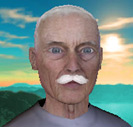
http://robot-hosting.com/php/login_nicholas.html
user name = guest
password = guest
(Collection of philosophical and mathematical proofs
for existence of God can be found in this site.)

Scientifically Philosophical Books for the layman
 ...
... ...
...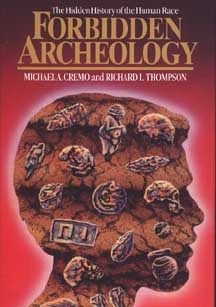 ...
...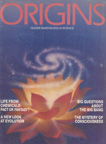
Click on any of these books to read more about them and where to get
a copy
or contact your local temple for purchases
sample of Life
comes from Life HERE.pdf

Lotus Imprints - Preserving Prabhupada's Legacy - The
Publishing House of Hari Sauri dasa
http://www.lotusimprints.com/

Quotes from Shastra - scriptures
View using Balaram font
nama om vinsu-padaya krsna-presthaya bhu-tale
srimate bhaktisiddhanta-sarasvatiti namine
I offer my respectful obeisances unto His Divine Grace Bhaktisiddhanta
Sarasvati, who is very dear to Lord Krnsa, having taken shelter at His
lotus feet.
sri- varsabhanavi-devi-dayitaya krpadhaye
krsna-sambandha-vijnana-dayine prabhave namah
I offer my respectful obeisances to Sri Varsabhanavi-devi-dayita Dasa
[another name of Srila Bhaktisiddhanta Sarasvati,
who is favored by Srimati Radharani and who is the ocean of transcendental
mercy and the deliverer of the science of Krsna.
madhuryojjvala-premadhya-sri-rupanuga-bhaktida-
sri-gaura-karuna-sakti-vigrahaya namo 'stu
te
I offer my respectful obeisances unto you, the personified energy of
Sri Caitanya's mercy, who deliver devotional service which is enriched
with conjugal love of Radha and Krsna, coming exactly in the line of revelation
of Srila Rupa Gosvami.
names te gaura-vani-sri-murtaye dina-tarine
rupanuga-viruddhapasiddhanta-dhvanta-harine
I offer my respectful obeisances unto you, who are the per sonified
teachings of Lord Caitanya. You are the deliverer of the fallen souls.
You do not tolerate any statement which is against the teachings of devotional
service enunciated by Srila Rupa Gosvami.
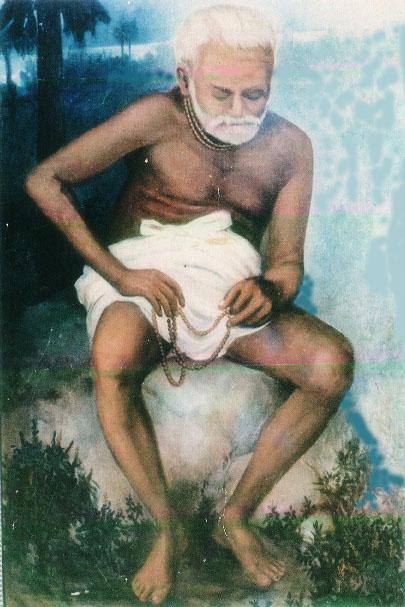
Srila Jagannatha Dasa Babaji .
Srila Jagannatha dasa Babaji Maharaja was respected by
all the Vaisnava community and was thus known as Vaisnava Sarvabhauma,
or chief amongst the Vaisnavas. There are some nice stories connecting
him with the finding of Sri Caitanya Mahaprabhu's birthplace recorded in
Sri Navadwipa Dhama Mahatmya.
Srila Jagannatha dasa Babaji Maharaja was born
around the year 1800 AD. He spent many years in Vrndavana where he became
famous as a perfect devotee, though more than this is not known of his
early years and pastimes. What we do know, however, is that he was particularly
enthusiastic in serving the Lord's devotees and performing 'kirtan'. In
later life his servant, Bihari Lal, used to carry him on his shoulders
in a basket, though when he would hear a 'kirtan' or himself be engaged
in 'kirtan', his body would extend itself out of the basket like a beautiful
banyan tree and he would loudly shout, "Nitai ki nam eneche re! Nitai,
ki nam diteche re!" "O Lord Nityananda, what a wonderful name you have
brought! O Nitai, what a wonderful name you have given!"
The stories which I will now relate are at the time when
he was more than 120 years old. Living in a tent at Sri Navadwipa with
Bihari Lal, his servant, he would eat 'prasadam' from a large brass plate
which someone had given as a donation. A litter of puppies which had taken
birth nearby began to come and eat off Jagannatha dasa Babaji Maharaja's
plate, but he did not object. After a few days however, Bihari Lal saw
what was happening, and disgusted to see the dogs eat from his 'gurus'
plate, he drove them away. Jagannatha dasa Babaji chastised Bihari Lal
angrily saying, "If the dogs can't eat I won't eat!" His servant had to
search out and bring back the puppies, and as they joined Babaji Maharaja
again over his plate he exclaimed, "All glories to the 'dhama' dogs!" Thus
he always displayed his great respect for all the residents of the holy
'dhamas'. On another occasion he had his servant purchase two hundred rupees
worth of 'rasagulas' and instructed him, "Feed them to all the 'dhamas'
cows, but don't give one to those rascal 'sahajiya babajis' (pretenders)."
Srila Jagannath dasa Babaji Maharaj was such a great devotee
that the famous Bhaktivinoda Thakura (Kedarnath Datta) called him the commanding
chief of the devotees. When Srila Bhaktivinoda was looking for the actual
place where Sri Caitanya Mahaprabhu's birthplace was, he asked Jagannatha
dasa Babaji Maharaja to go with him. During the many changes in the course
of flow of the mighty Ganges River, some parts of the sacred 'dhama' of
Navadwipa (nine islands) had changed. The Ganges had revealed old and lost
places and reclaimed new ones. To his surprise Bhaktivinoda Thakura discovered
that the modern day city called Navadwipa was not more than 100 years old
and therefore wasn't the Navadwipa of Sri Caitanya. Some said the birth
site was on a place now in the Ganges, while some said it was in the city
of Navadwipa. Dissatisfied, Bhaktivinoda pushed on looking. He found some
antiquarian maps and government records, and authentic books written at
the time of Lord Caitanya, all of which agreed that Mayapur Navadwipa Dhama
is situated on the east bank of the Ganges. To Bhaktivinoda's amazement
he found several large mounds covered with sacred Tulasi plants on land
owned by Mohammedans. It was shrouded with local rumours of strange lights
and sounds, so the owner, believing it to be haunted, would not go there.
Many old babajis of the time, however, believed this to be the actual birthplace
of Sri Caitanya Mahaprabhu. Convinced it was true, Bhaktivinoda, inspired
by Jagannatha dasa Babaji, went there to the spot, with Jagannatha dasa
Babaji being carried in his basket.
Due to his old age, Srila Jagannatha dasa Babaji
couldn't open his eyes, but had to forcibly open them with his fingers,
what to speak of walk. If he went anywhere he was carried in his basket
by Bihari Lal, but upon arriving at the transcendental site, he leapt out
of the basket and danced in ecstasy shouting, "Haribol!" and "Gauranga!",
definitely establishing it to be the very same birthplace of Lord Caitanya.
gauravirbhava bhumes twam nirdesta
sajjana priyah
vaisnava sarvabhauma
sri jagannathaya te namah
"I offer my respectful obeisances unto Sri Jagannatha
dasa Babaji Maharaja, who is respected by the entire Vaisnava community
and who discovered the place where Lord Caitanya appeared."
Srila Jagannatha dasa Babaji Maharaja had a disciple named
Bhagavat dasa Babaji Maharaja, and Gaura Kisora dasa Babaji was his disciple.
However at this time there was another great exponent of Vaisnava teachings
that, on passing, we have already mentioned. His name is Srila Bhaktivinoda
Thakura. And so the line again divides like this:
JAGANNATHA DASA BABAJI MAHARAJA
I
I
BHAGAVAT
DASA BABAJI
SRILA BHAKTIVINODA THAKURA
GAURA KISORA
DASA BABAJI



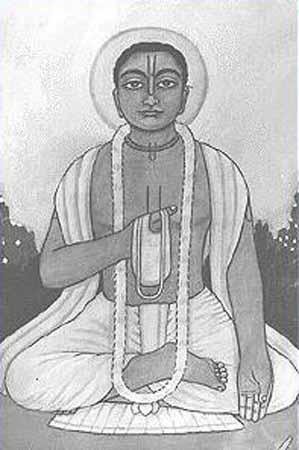
SRI RASKIKANANDA
DEVA GOSVAMI
In the Christian year 1590 (Sakabda 1512), on the first
day of the bright fortnight of the month of Kartik, during the night of
the festival Dipamalika, when the houses are decorated with rows of lamps,
Sri Rasikananda Deva made his appearance in this world. His father was
Sri Acyuta Deva, the king of Rohini. After passing many years without having
a male issue, Sri Acyuta Deva, by the mercy of Sri Jagadisa (Jagannath),
was blessed with this jewel of a son. The village of Rohini or Royni was
situated within the country known as Mallabhumi, encompassed on one side
by the Suvarnarekha River (Suvarna meaning golden and rekha, a line). This
Suvarnarekha River cleansed the sins of all the local people. Near Royni
was another village of the name Barayita, by the side of which flowed the
Dolanganadi River, whose banks were adorned with beautiful gardens. Raja
Acyuta Deva very affectionately maintained his subjects and was famous
for impeccably observing the rites attendant upon kings. In the village
of Royni the son of King Acyuta appeared as the sun appears in the eastern
sky and became dearly beloved by the people. He was known as Rasikananda
and also Murari. As he grew up, shining qualities appeared by degrees in
his person that caused the further exaltation of his family, just as the
waxing moon gradually expands its influence in the night sky and causes
the sea to rise. At a very young age he became quite proficient in all
of the scriptures. He was very devoted to his parents, especially his mother,
whose name was Bhavani. His father married him at very young age. Murari's
wife Syamadasi was a mine of good character who hailed from the village
of Ghonta Sila, not far from Royni on the banks of the Suvarna Rekha, where
in days of old the Pandavas had lived in exile. One day, Murari was sitting
in a lonely place, wondering when and where he might become so fortunate
as to get shelter at the lotus feet of a spiritual preceptor. Just then
a voice from the sky addressed him, "Don't be in anxiety, you will become
the disciple of Sri Syamananda." Having heard this proclamation, Rasik
Murari became very jubilant, and began to repeatedly murmur the name Syamananda,
as though chanting japa. From moment to moment his eagerness increased
without diminition, as tears flowed from his eyes by his chanting of the
name of Syamananda. He was in such a state that he spend most of the night
sleeplessly, calling to his master Syamananda. Finally, towards the early
morning, he drifted off to the land of dreams, where he saw his spiritual
master, the very figure of charm and grace. Smilingly, Syamananda informed
him, "When tomorrow the eastern sky becomes tinged with pink, you will
obtain me." Saying this, Syamananda disappeared. Rasikananda's heart began
to swell in ecstatic bliss. Then, with the first rays of morning which
dispel the dense darkness of the world, the wise Murari sat silently watching
the path. After some time Syamananda approached from the distance, looking
as beautifully effulgent as the sun and surrounded by his disciples like
Sri Kishora dasa and others. His smiling face was like the lotus
flower that opens to greet its friend the sun, and his chest was as broad
as a door. His captivating appearance was made all the more irresistable
by the sweet sounds of 'Sri Krsna Caitanya-Nityananda' emanating from his
lotus mouth. Absorbed in intense love he moved along the path like the
clouds move in the sky. When Rasika caught sight of this divine form, he
fell down in front of him to touch his lotus feet. In great ecstasy Shyamananda
embraced him and began to bathe him with his tears of ecstatic love. Sri
Rasika Murari then felt himself to be one of the most fortunate living
beings within this universe. On an auspicious day Syamananda initiated
Rasika and his wife in Radha-Krsna mantra. After that, Rasikananda began
to travel with his guru, during which time he became a very intimate disciple.
Syamananda then bestowed upon him the service of Sri Radha- Govinda Deva
at Sri Gopiballabhapur. Rasikananda became totally engaged in their Lordships
service, and the devotees were charmed by his excellent services. At Gopiballabhpur
and other places he began to seriously take up the preaching of the message
of Sri Gaura-Nityananda. By his influence many atheists and unbelievers
were transformed into devotees of Sri Gaura-Nityananda. "By the tremendous
influence of Rasikananda's preaching, many rogues, robbers and atheists
were delivered from their sinful activities and received his mercy. He
distributed the jewel of devotion even to the infidel Mohammedans, as he
travelled from village to village, in the company of his disciples. He
even converted the wild elephant which was sent for his destruction into
his disciple and engaged him in the service of Krsna and the Vaisnavas.
That wicked miscreant who sent the elephant, a Mohammedan, bowed at his
feet when he realised his mistake. It is not possible to count the number
of living entities that were extricated from the ocean of material existence
by Rasikananda Deva's association. He was always intoxicated with the chanting
of the Holy Name. Who cannot but be overwhelmed by hearing about his uncommon
qualities?" [B.R. 15.86] By Sri Rasikananda's mercy many Mohammedans, who
were actually just impious and wicked atheists, became worshipers of the
Supreme Lord. Also many virtuous kings and zamindars such as the king of
Mayurbhanj named Vaidyanatha Bhanj, the king of Patashpur known as Gajapati
and Candrabhanu, the king of Moyna, took shelter at his lotus feet. What
to speak of those pious and noble gentlemen, even the sinful zamindar Bhima,
the Mohammedan Suba Ahmadbeg and the wicked atheist Srikar also surrendered
themselves at his lotus feet. A vicious, wild elephant was tamed by Rasikananda's
transcendental influence and henceforward was known as Gopala das. Later,
two jungle tigers likewise gave up their ferocious nature. Accepting the
order of his guru, Sri Syamananda, on his head, Rasikananda preached the
message of Sri Gaursundar in the world for approximately 16 years. Thereafter
he entered into his eternal pastimes through the lotus feet of Gopinatha
at Remuna. On the first day of the bright fortnight in the month of Phalguna,
Sakabda 1574 (Christian year 1652), Rasikananda quietly slipped out of
the village Santa without anyone's notice and walked to Remuna. Arriving
there, he discussed Krsna-katha with the devotees there for a while and
instructed everyone to serve Sri Krsna with devotion. Then, after requesting
them to begin sankirtana, he entered the temple of Sri Gopinatha, and after
touching Kshira-chora Gopinatha's lotus feet, which bestow complete fearlessness,
he entered into their ultimate shelter.
Rasikananda prabhu’s samadhi is at the Temple of Kshira-chora
Gopinath at Remuna just in front and to the right as you go in the main
gate, with the temple to the left, and admin’ offices straight ahead.
Sri Rasikananda had three sons: Sri Radhananda, Sri Krsna-Govinda
and Sri Radha-Krsna. The present servants of Sri Sri Radha-Govindadeva
at Gopiballabhapur are their descendents. He composed Sri Shyamananda-sataka,
Srimad Bhagavatastaka as well as other hymns and songs. His Sripat Gopiballabhpur
can be reached from Calcutta by taking a train to Khavagpur, and a bus
to Gopiballabhpur from there. There is also a temple of Rasikananda at
Puri. One year, during Lord Jagannatha's Ratha-yatra festival, Rasikananda
Deva was preaching somewhere in the country, but when he realised that
it was time for Ratha-yatra he dropped everything and rushed like the wind
in order to come to Nilacala in time for the festival.
But in the meantime the festival had already
begun. Lord Jagannath, Who felt reciprocal separation from His dear devotee
Rasikananda, caused the Rath to stop. Though the king summoned his elephants
to push the Ratha, under no circumstances could they budge it, not even
an inch. Then Lord Jagannatha, seeing that the king was becoming frustrated,
informed him that he was waiting for His devotee Rasika. Finally Rasikananda
Deva arrived, carrying with him many offerings of silk clothes and other
presents. He fell down to offer his dandavats before Lord Jagannatha, and
the king requested him to pull the rope at which the cart began to easily
move along the road, just as the clouds move in the sky. Later the king
requested Rasikananda to accept a gift of land so he might establish a
temple there. Rasikananda requested the place known as Fultota Math, which
is now known as Kunja Math. There he installed the Deity of Sri Bat Krsna.
The Deity is now known as Sri Sri Radha-Rasika Raya.

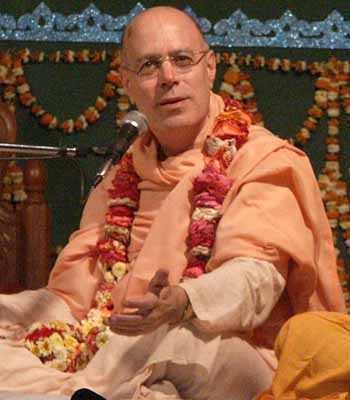
Remembering His Holiness
Srila Tamal Krishna Goswami Srila Gurudev



(1946 - 2002)
Contents of page:
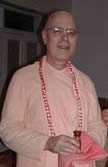
The
Soul and its Destiny: Vaishnava Perspectives by HH Tamal Krishna Goswami
Announcement:
TAMAL KRISHNA GOSWAMI PASSES AWAY IN MAYAPURA ON MARCH
15
Its with deep sorrow that we inform you of the passing
away of His Holiness Tamal Krishna Goswami in Mayapura on March 15, 2002.
His Holiness Tamal Krishna Goswami Maharaja, ISKCON Governing
Body Commissioner and initiating spiritual master, was accepted as a disciple
by His Divine Grace A.C. Bhaktivedanta Swami Prabhupada in 1968.
He quickly emerged as a leader in ISKCON, establishing temples around the
world. As one of Srila Prabhupada's most trusted disciples, he also
worked closely with Srila Prabhupada as his personal secretary. A brief
biography of Tamal Krishna Goswami is available at http://www.goswami.com.
More information about the unfortunate accident is available below, in
a communication brief released by His Grace Anuttama Prabhu, ISKCON Communication
Minister.
--------------------------------------------------------------
From: Anuttama (das) ACBSP
(IC N.America)
Date: 15-Mar-02
------------------------------------------------------------
TAMAL KRISHNA GOSWAMI PASSES AWAY IN MAYAPURA ON MARCH
15
Mayapura, India. At approximately 7 a.m. local time, His
Holiness Tamal Krishna Goswami left his body after sustaining injuries
in a car accident. He was traveling in a taxi with two devotees, bound
for the Calcutta airport after leaving Mayapura at 4:15 in the morning.
Vrindavanesvari Dasi
of Auckland, New Zealand, the wife of Kalasamvara Dasa also passed on.
She was born on this date, March 15, in 1961. Kalasamvara Prabhu was injured,
but not severely. The status of the taxi driver is not yet known.
The taxi had driven approximately halfway to Calcutta
before the accident occurred. It was reported that the driver ran into
a tree while trying to avoid a truck on the road. Tamal Krishna Goswami,
Vrindavanesvari dasi, and Kalasamvara were taken to the Anulia Hospital
in Ranaghat.
Announcements were made at the Mayapura temple shortly
after the accident, and several carloads of sannyasis and godbrothers rushed
to the hospital. At the temple it was initially reported that Tamal Krishna
Goswami and other devotees were unconscious from the accident. Tamal Krishna
Maharaja's and Vrindavanesvari Dasi's
passing on was announced at approximately 7 a.m.
The accident occurred at Phuliya, near Shantipura, about
sixty kilometers from Mayapura. This very sacred place is mentioned several
times in the Caitanya-caritamrita in connection with the pastimes of Srila
Haridasa Thakura. Phuliya is the place where Haridasa Thakur lived in a
cave and chanted 300,000 names of Krishna daily. There Haridasa also resisted
the temptation by Maya, and this is also where he was beaten in twenty-two
marketplaces for his devotion to the holy name.
All seminars and courses in Mayapura have been cancelled
for the day. The devotees will be holding kirtanas and glorifying Tamal
Krishna Maharaja in special meetings throughout the day. Speakers have
noted that today is the anniversary of the disappearance of Jagannatha
Dasa Babaji Maharaja and Rasikananda Prabhu.
During a mid-day session of remembrances by senior devotees,
Kesava Bharati Prabhu read from Tamal Krishna Goswami's will, which had
been forwarded by phone from Dallas, Texas. In the will, Maharaja had stated
that he wanted his body to be placed in samadhi at Govardhana; but he specified
one alternative, namely, that if he were to pass away in Mayapura, then
his body should be placed in samadhi in Mayapura.
"Tamal Krishna Maharaja was a great pioneer," said GBC
Chairman Giridhari Swami, a close friend of Tamal Krishna Goswami's. "He
led the society and the preaching for Srila Prabhupada. He served on the
first GBC body. He was empowered to purchase the first land for Mayapura,
he infused energy into the book distribution in America through the Radha-Damodara
party, and he was the first to go to China."
"Maharaja had not been to the Mayapura annual meetings
for several years because he had taken a leave of absence from the GBC
to complete his doctorate work," Kesava Bharati Prabhu said. "Every evening
after the meetings this year, a large group of devotees, including many
sannyasi godbrothers such as Niranjana Swami, Radhanath Swami, Sivarama
Swami, B.B. Govinda Swami and Jayadvaita Swami, packed into his rooms and
chanted together for a couple of hours. Tamal Krishna Goswami was absorbed
in a mood of relishing the chanting in the dhama. Just as he was leaving
this morning, he spoke to me again about this chanting. He said that kirtana
is so wonderful; it is the way to purify our hearts and solve many problems."
Tamal Krishna Goswami was completing his doctorate work
at Cambridge University. According to Ravindra Svarupa Prabhu, Maharaja
was completing the last chapter of his Ph.D. thesis, which is about Srila
Prabhupada. He was serving as the Governing Body Commissioner for Taiwan,
China, the Philippines, Fiji, Texas, Mayapura and Calcutta. He was the
author of several books on Krishna consciousness. He was 55 years old.
"A prominent limb of Srila Prabhupada's legacy has left
the world," said Radhanath Swami. "The list of Tamal Krishna Goswami's
accomplishments is so vast; he was empowered by Srila Prabhupada to accomplish
many difficult, difficult tasks."
Submitted by Anuttama Dasa
ISKCON Communications Minister
Procession
toward the Temple:
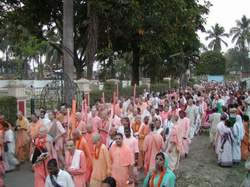
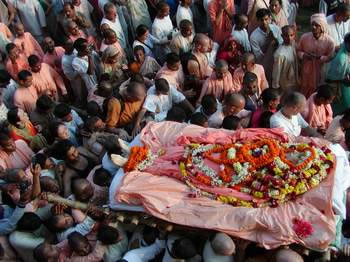
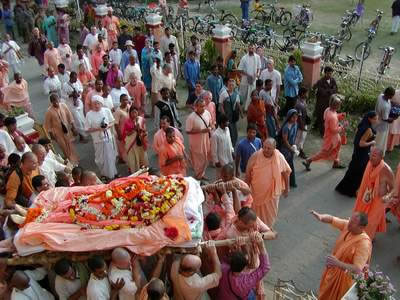
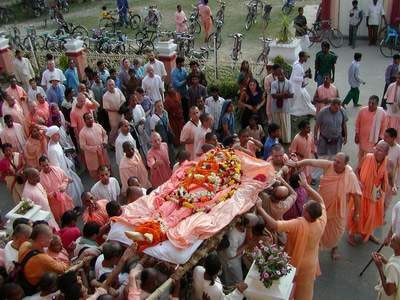
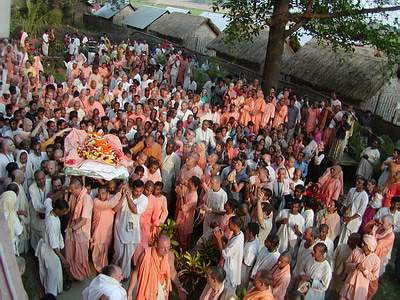
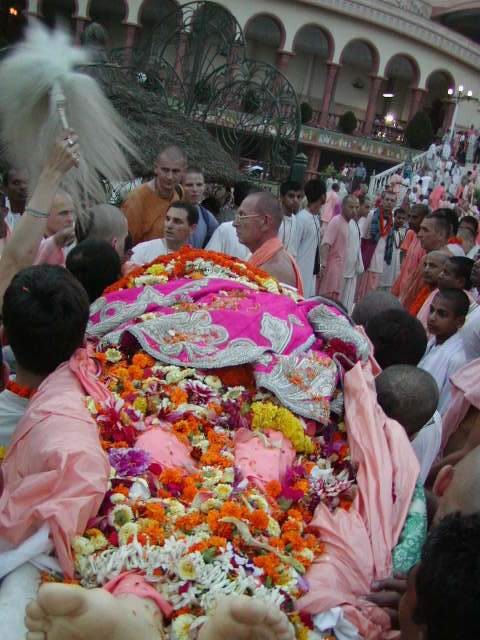
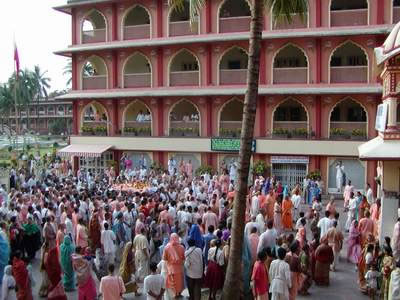
Inside
the Temple - before the Deities:
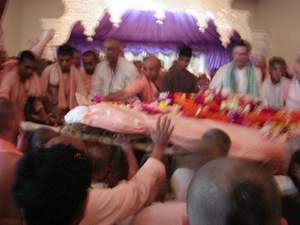
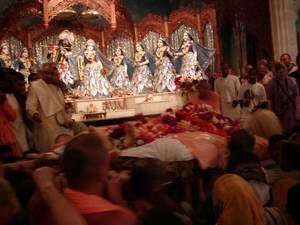
(left) In front of Pancha Tattwa (right) in front of Radha Madhava
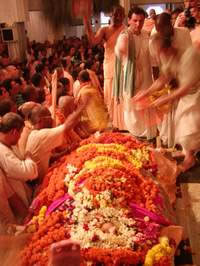
Devotees offering flower garlands
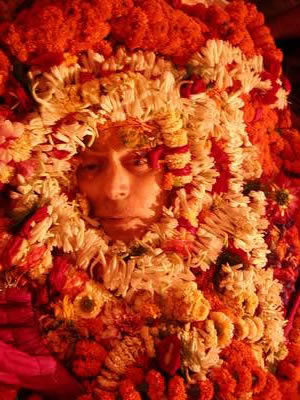
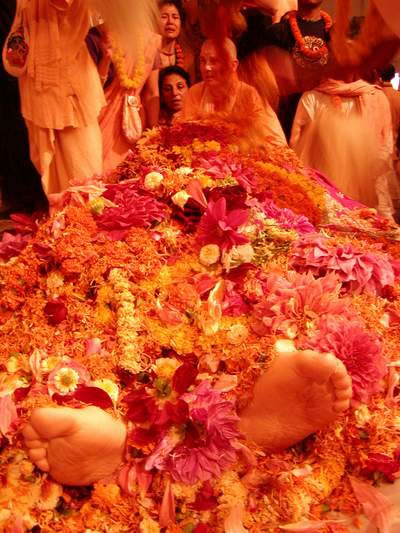
His Holiness Tamal Krishna mahara's lotus feet
Samadhi Pictures:
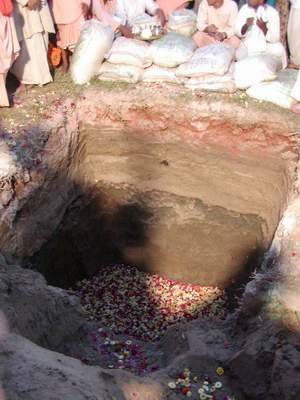
Preparing the Samadhi tomb, with bags of salt at the ready
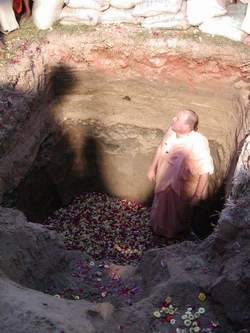
HH Jayapataka Swami overseeing the proceedings
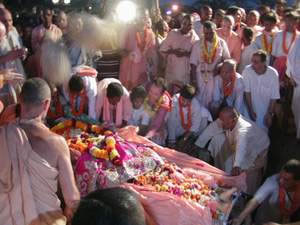
Lowering the body down into the samadhi tomb
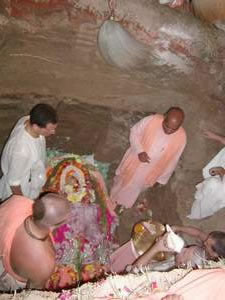
The last arati before the salt is placed around the body
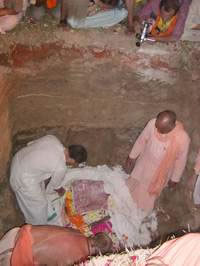
Covering maharaj's face with maha cloth from Radha Madhava before the
salt is placed there
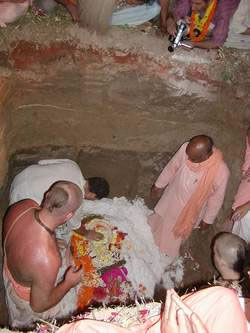
Covering the face with maha-prasad flowers before the salt is place
there.
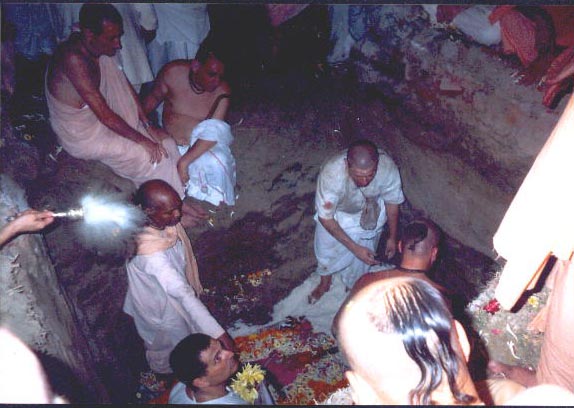
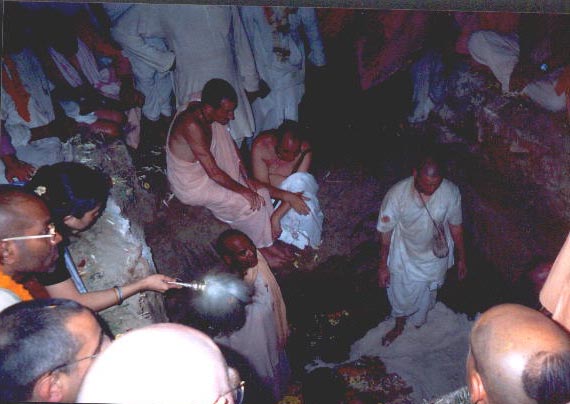
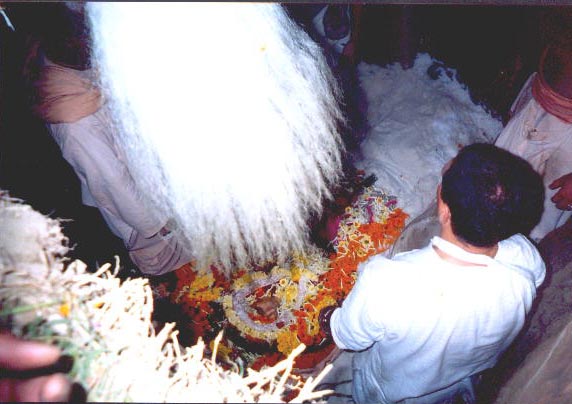
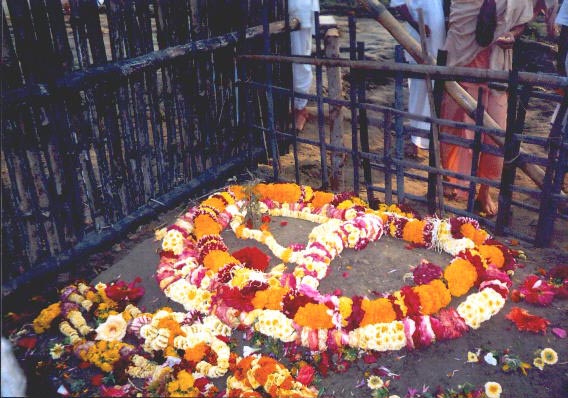
After the samadhi tomb was filled
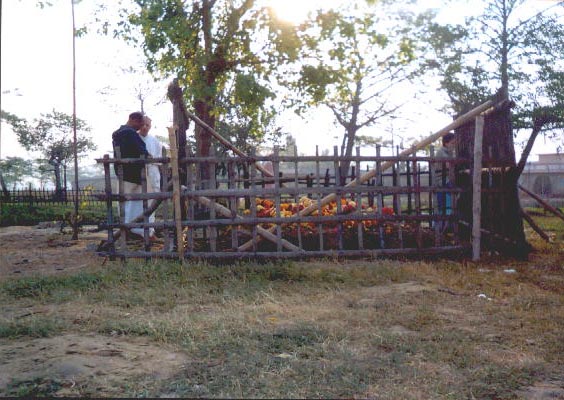
The samadhi site's location in Mayapur
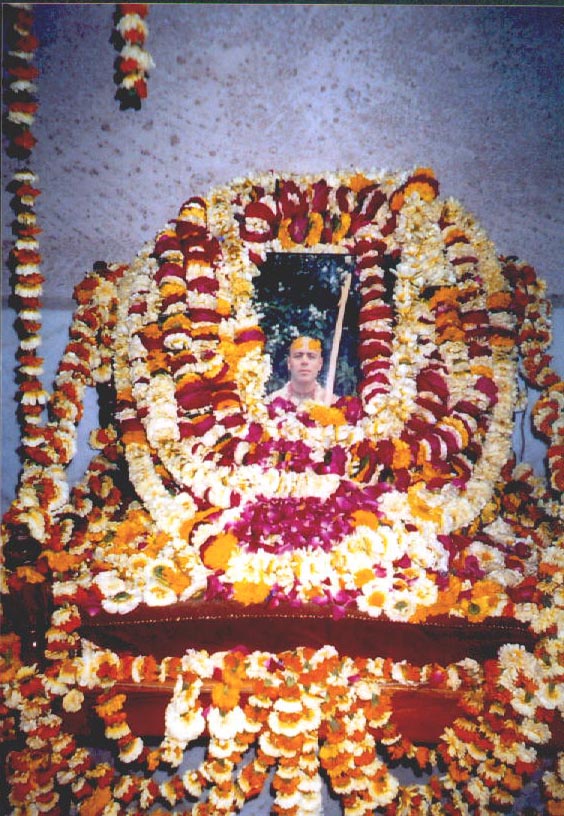
Puspa samadhi at Govardhan
Hill
In Memoriam
Dear prabhus,
Please accept my most humble obeisances,
All glories to Srila Prabhupada,
All glories to Srila Tamal Krishna Goswami Srila Gurudev,
All glories to Sri Guru and Gauranga.
Please accept our heartfelt condolences to friends, and
disciples of HH Tamal Krishna Goswami, and to family, and friends of HG
Vrindavanesvari devi dasi who both passed away on 15th March just outside
Mayapur, India.
You may want to see the updates and reports and surrounding
coverage on the Chakra web-site regarding the tragic loss to the Vaishnava
community of HH Tamal Krishna Goswami
http://www.chakra.org/mainpages/obituaries/tkg.htm
There are also pictorial coverage of his being placed
into samadhi by the devotees headed by HH Jayapataka Swami:
http://www.mayapur.info/HH_Tamal_krsna_Maharaja_samadhi.html
Tribute to HH Tamal Krishna Goswami:
http://www.chakra.org/mainpages/obituaries/tkg.htm
Memories of HH Tamal Krishna maharaj by Siddhanta dasa:
http://www.vnn.org/editorials/ET0203/ET16-7219.html
HH Tamal Krishna Goswami Tape Ministry:
http://tkgtm.com/frameset.htm
Memorial to Vrindavenesvari mataji by Krsnendu prabhu:
http://www.vnn.org/editorials/ET0203/ET17-7220.html
http://www.chakra.org/2002/03/18/vrndavanesvari.by.krsnendu/index.htm
From Bhaktimarga mataji:
http://www.chakra.org/2002/03/18/vrndavanesvari.by.bhaktimarg.dd/index.htm
From Indira mataji:
http://www.chakra.org/2002/03/18/vrndavanesvari.by.indira.dd/index.htm
Our Memorial to Vrindavanesvari mataji:
http://www.hknet.org.nz/Vrindavanesvaridd.html
In Memorial to other recent departures:
http://chakra.org/mainpages/obituaries/index.htm

All pictures from Srimad Bhagavatam and Iskcon works - Copyright ©2005
The Bhaktivedanta Book Trust
International, on the web at .http://www.krishna.com/.
Used with permission.

Courtesy of http://www.vedabase.com/
used
with permission









![]()
![]()
![]()
![]()

![]()
![]()
![]()
![]()

![]()
![]()
![]()
![]()















































